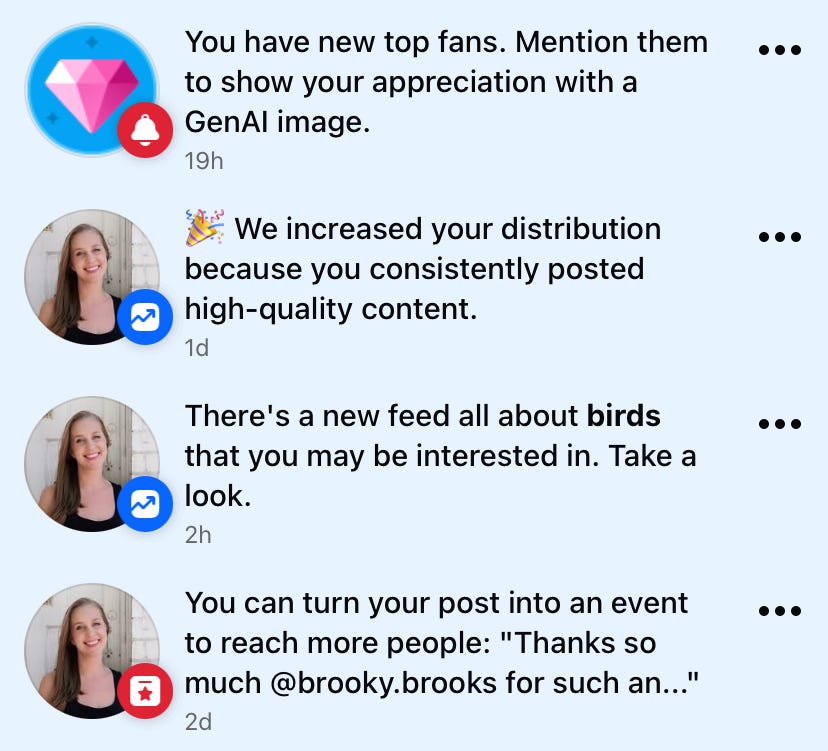Remember when Facebook was basically just like your online photo album for sharing with your friends and family, and you little thought one day this private life would be a data mine?
When Instagram felt like a celebration of hobby photography, an uplifting look at the beautiful everyday moments of life?
Before a prevailing wisdom emerged and was drummed into you: that to be a writer you needed to recreate yourself as a brand, an image honed, groomed and constantly fed.
Eventually you might have begun to notice: the more you overshared, the more the algorithms liked it – even if to you, it didn’t feel right.
Now, being on Facebook, Instagram, even WhatsApp – especially if you’re a creative trying to live in this liminal space between the personal and the professional – might be getting harder and harder, despite their seemingly convenient tools, their groups, events and polls.
Because you’re also getting bombarded with notifications, overwhelm and constant distraction from your intended task. They’re changing algorithms and best practices on you repeatedly. Trying to make you into a zany videographer, always camera-ready, to chase that ever-decreasing reach. Denying things like link-sharing or scheduling on certain apps, forcing you to get the functionality you need through third-party sites that also suck your time, so you’ve also got to learn Business Suite and Linktree or Link In Bio.
They’re making you pay for ads if you want growth (but if your accountant wants an accurate tax receipt for an Instagram ad? No chance). They’re changing crop requirements without warning so all your old square posts now look weird on your timeline. Warning you that soon they’ll be phasing out hashtags. Wait, what?
Your reward for growing your audience is more toxic, spam and hate comments, and more random messages from marketers wanting payment to feature your book. Or knowing your public posts are feeding Meta’s generative AI model with no opt-out for Australians.
Meta’s meanwhile withdrawn from financial deals to compensate traditional media outlets for their journalism, resulting in job losses – and less arts coverage in those outlets.
And now, they’re using LibGen’s pirated copies of your books, and the books of your peers and your favourite authors all over the world, to feed their generative AI, with no consent or compensation.
If you’re anything like us, it’s all left you wondering why it suddenly seems like the costs are far outweighing the benefits.
We are a group of Australian writers and readers who feel enough is enough.
We want to help and encourage each other, and the wider reading and writing community, to sever ties with Meta in particular, but also any other problematic platform, in a practical, strategic way that increases our collective impact.
To make space to build more meaningful connections, both on and offline.
We know this is not simple. We know the bigger the following that you’ve built the more you may feel you have to lose. We know change can be time-consuming, complex and daunting (just like your socials).
But we feel we may not lose as much as we are conditioned to think. And we may gain more than we dared to dream.
Here’s what we will do.
Provide ideas, support, materials and a sense of community and excitement about a future with more freedom and diversity. We will share our own journeys and what we learn as we take our own first steps.
We will facilitate you taking simple actions to indicate your displeasure with Meta’s use of LibGen, compiling all the campaigns and petitions out there, because whether readers and writers leave Meta en masse or not, these companies must be held to account.
We will collect research, articles and tips to help and inspire you to find platforms that work for you.
We will run a few fun collective actions over the year to come, and reach out to other organisations for support in this.
We will do all this under the hashtag #metabreakup – feel free to start using it, as we know so many of you are writing about this topic already!
Here’s what we will not do.
We will not be prescriptive and say one size fits all. We will not shame anyone who wants to stay on Meta. We will not be upset with anyone who wants to get off some platforms but not others, or keep, for example, a Meta “landing page”.
We will not pretend any platform is perfect. Sometimes all we have is the lesser evil; you have to start somewhere; and the worst thing is to do nothing.
We will not try to convince anyone to leave who does not want to. If you already know deep down it’s time, that you want to “be the change” and create the world you want, a world not ruled by Meta, this is for you.
One more thing.
A recent reflection from respected publishing insider Jane Friedman on industry trends and examples concludes that yes, publishers want authors with a “platform” – but this matters more for some types of books than others. Also, a “platform” can be many more things than a social media following.
“Ultimately, your platform-building process will become as much a creative exercise as the work you produce,” Friedman writes.
If you’ve been feeling for quite some time like Meta doesn’t fit that description, join us.
We’re ready to get creative.















Bravo!!!
Yay! So pleased I found you here... I'm in the UK, this is a start 👍